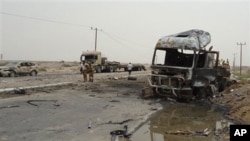Fighters with al-Qaida's Yemen-based affiliate, known as al-Qaida in the Arabian Peninsula, originated in the ranks of the mujahedin veterans of the anti-Soviet war in the 1980s in Afghanistan.
Originally, the militants operated in separate branches out of both Saudi Arabia and Yemen. But beginning in 2003, Saudi authorities cracked down on al-Qaida and many of the Saudi militants fled across the border to Yemen, taking advantage of the civil unrest there and the safehavens provided in Yemen's large areas of ungoverned territory.
The Saudi and Yemeni branches of al-Qaida officially merged in January 2009 to form the present day's al-Qaida in the Arabian Peninsula, or AQAP.
Following the merger, the United States issued an open declaration of war against the group, and the Yemeni government started its own crackdown on the jihadist movement. Over the years, the U.S. military has been coordinating with the Central Intelligence Agency and Yemeni authorities to attack AQAP targets, usually by manned aircraft or cruise missiles.
In late 2009, AQAP expanded its operations outside of Yemen, most notably by sending Umar Farouk Abdulmutallab in a botched attempt to detonate an explosive device aboard a U.S. flight on December 25.
U.S. authorities also accused one of the group's leaders, U.S.-Yemeni citizen and radical cleric Anwar al-Awlaki, of being in contact with a U.S. Army psychiatrist who allegedly went on a shooting spree in November 2009 at an American military base, killing 13 people.
In addition, Awlaki helped expand the group's outreach in English, by using online sermons to galvanize followers. AQAP also publishes an English-language magazine online, called "Inspire," to preach its message and describe its attacks.
Ties between Osama bin Laden's original al-Qaida, believed to be based in Pakistan's tribal regions, and AQAP are assumed to be strong. But most analysts believe that the terror network affiliate conceives and orchestrates attacks on its own.
Some information for this report was provided by AP and Reuters.




